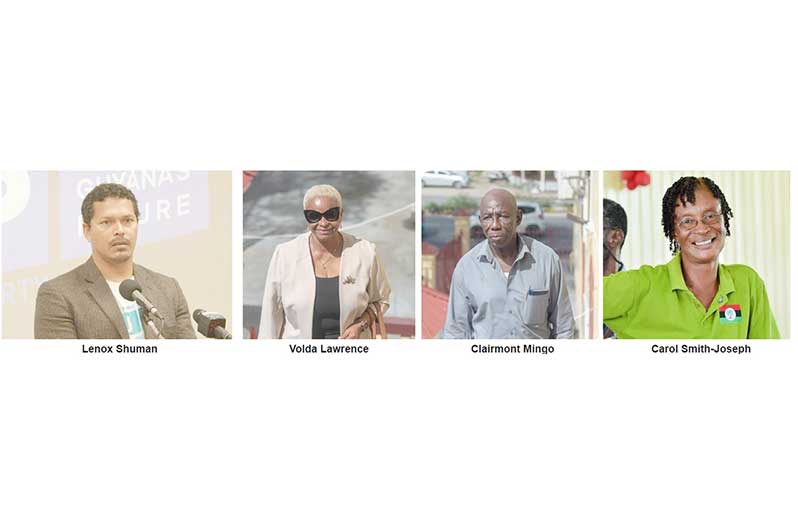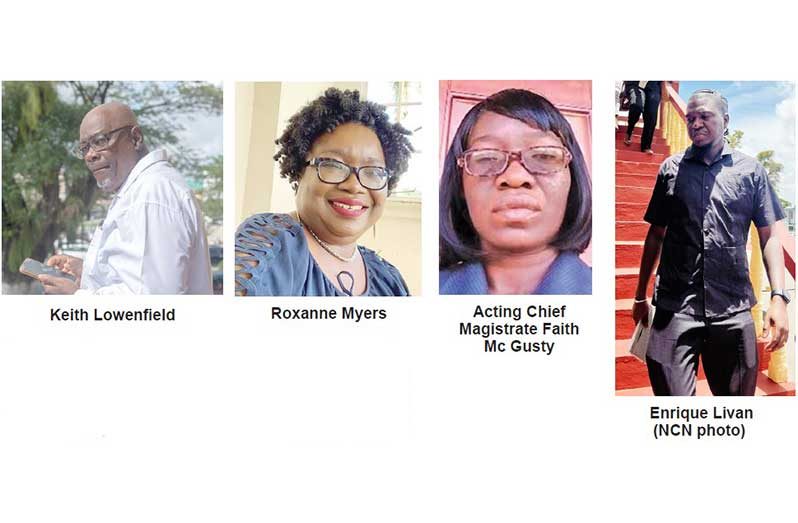– describes seeing ‘pre-populated’ spreadsheet
LIBERTY and Justice Party (LJP) Leader Lenox Shuman on Tuesday forcefully rejected suggestions that his candidacy in the March 2020 General and Regional Elections was effectively as a proxy for the governing People’s Progressive Party/Civic (PPP/C).
The accusation was put to him during a tense cross-examination at the Georgetown Magistrates’ Court by defence attorney Eusi Anderson in the ongoing election fraud trial.
“Your participation as a candidate in the elections was in effect as a proxy for the People’s Progressive Party Civic (PPP/C),” Anderson charged.
“That suggestion would be incorrect,” Shuman replied firmly.
The back-and-forth set the tone for a heated afternoon of exchanges, as Anderson sought to paint Shuman as a partisan actor who benefitted from the PPP/C following the disputed March 2020 elections. Shuman, however, consistently pushed back, dismissing allegations of bias, financial links, or political rewards for his role during the contentious five-month electoral impasse.
From the outset, Anderson challenged the credibility of Shuman’s testimony.
“All of what you claimed occurred on the March 3, 2020, did not happen at all. Do you agree with my suggestions, yes or no?” Anderson asked pointedly.
“No,” Shuman replied.
Anderson then accused him of acting as a de facto proxy for the PPP/C during the elections campaign. “Utterly and absolutely incorrect,” Shuman shot back when pressed on whether PPP/C funding had underpinned much of the LJP’s campaign.
Anderson pressed further, tying Shuman’s subsequent political appointments to alleged rewards from the PPP/C.
“Your appointment 20 days after August 2, 2020, as a presidential advisor together with your election as a deputy Speaker of the National Assembly was the commencement of your rewards for supporting the PPP/C during the five-month impasse,” Anderson suggested.
“Incorrect,” Shuman responded, denying any such arrangement.
The defence lawyer then sharpened his attack: “I have to suggest to you that you were a biased Speaker completely opposed to the then opposition A Partnership for National Unity + Alliance for Change (APNU+AFC).”
Again, Shuman’s answer was unequivocal: “Incorrect.”
The exchanges continued in that vein, with Anderson asserting that Shuman’s testimony was designed to serve his “self-interest and benefit as a beneficiary of the PPP/C.”
“Incorrect,” Shuman retorted.
However, the LJP leader did concede to two of Anderson’s suggestions: that since August 2020, he had never publicly supported APNU+AFC in the way he has the PPP/C, and that he had never been employed or received benefits from the coalition.
“That is correct,” he admitted in both instances.
But when Anderson capped his line of questioning with the blunt charge that “everything in your statement and your testimony are complete lies,” Shuman did not hesitate.
“Absolutely incorrect,” he said.
The cross-examination came a day after Shuman testified about his intervention during the disputed Region Four tabulation at the Ashmins Building, which served as the Guyana Elections Commission’s (GECOM) Command Centre during the March 2020 General and Regional Elections.
Shuman told the court that he stepped in after observing what he described as an “attempted fraud” by then-GECOM IT officer Enrique Livan, one of nine defendants now facing electoral fraud charges.
Pressed on Monday by defence attorney Nigel Hughes on what authority gave him the right to handle documents and enter a GECOM-controlled room, Shuman admitted: “Nowhere that I can read.”
But he insisted his actions were guided by duty: “The attempted fraud by the accused [Livan]. To safeguard the electorate’s franchise.”
He defended his conduct as the response of any “civic-minded person” confronted with wrongdoing.
“Any civic-minded person would intervene when they see something is going wrong,” he told the court.
Hughes dismissed this as assuming “a God-given power.” Shuman replied, “I can’t say,” standing by his decision to intervene.
Shuman recounted that on March 3, 2020, he observed repeated errors in Region Four figures being projected by Livan, which did not match Statements of Poll (SoPs) in the possession of political parties.
When Livan—citing fatigue—left the room, Shuman said he later found him with the same laptop connected to a flash drive and printer, working on what appeared to be a “pre-populated” spreadsheet.
“I saw what appeared to be a pre-populated spreadsheet of results before Mr. Livan quickly closed it,” Shuman testified.
He reported his concerns to then Senior Superintendent of Police Edgar Thomas, telling him “something seemed off” about Livan’s activities, though he admitted he could not recall his exact words after five years.
Hughes pressed him on whether this amounted to a criminal complaint.
“It was not a criminal complaint; it was a complaint,” Shuman clarified.
“So, you made a complaint to the police but it was not a criminal complaint?” Hughes asked.
“Correct,” Shuman replied.
Shuman also admitted to picking up a pile of documents during the confusion at Ashmins Building but denied they were SoPs.
“I said a pile of documents, not SoPs,” he stressed, noting that he could not confirm whether the papers belonged to GECOM.
When Hughes suggested that this was conduct born of entitlement as a presidential candidate, Shuman disagreed.
“You used to call them Nosey Parkers in the olden days,” Hughes stated.
“I wouldn’t know that,” Shuman retorted.
The term “Nosey Parker” is an old expression for someone overly inquisitive about others’ affairs.
Shuman’s testimony is part of a broader trial concerning efforts to manipulate Region Four’s results in 2020, widely seen as the most contentious election in Guyana’s modern history.
Those facing charges include former Chief Elections Officer (CEO) Keith Lowenfield, former Deputy CEO Roxanne Myers, former Returning Officer Clairmont Mingo, former Health Minister Volda Lawrence, People’s National Congress Reform member Carol Smith-Joseph and former GECOM staffers Sheffern February, Enrique Livan, Denise Babb-Cummings, and Michelle Miller.
They collectively face 19 charges ranging from conspiracy to defraud to misconduct in public office. Each has pleaded not guilty and secured bail.
The defence team—comprising Nigel Hughes, Dexter Todd, Darren Wade, Ronald Daniels, and Anderson—has sought to cast doubt on prosecution witnesses.
The prosecution, led by King’s Counsel Darshan Ramdhani, maintains that the defendants each played a “critical role” in attempts to inflate votes for the APNU+AFC coalition while reducing those of the PPP/C.
Initial results announced by Lowenfield had declared an APNU+AFC victory, with 171,825 votes to the PPP/C’s 166,343.
But after five months of court battles and a Caribbean Community (CARICOM)-supervised recount, the PPP/C was declared the winner with 233,336 votes to APNU+AFC’s 217,920, leading to Dr Irfaan Ali being sworn in as President on August 2, 2020.
The fallout from the disputed process prompted GECOM to terminate the contracts of Lowenfield, Myers, and Mingo in August 2021.
The trial, which has seen frequent courtroom clashes between prosecution and defence, continues today before Acting Chief Magistrate Faith McGusty.



.jpg)








